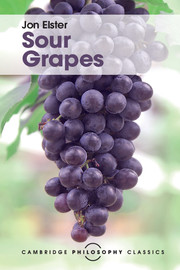Summary
Certain Renard gascon, d'autres disent normand,
Mourant presque de faim, vit au haut d'une treille
Des Raisins mûrs apparemment
Et couverts d'une peau vermeille.
Le galant en eût volontiers fait un repas;
Mais comme il n'y pouvait atteindre:
‘Ils sont trop verts, dit-il, et faits pour des goujats.’
Fit-il pas mieux que de se plaindre?
(La Fontaine, Fables XXX.xi)God grant us the serenity to accept the things we cannot change, courage to change the things we can and wisdom to know the difference.
(Alcoholics Anonymous prayer)Le ‘ces raisins sont trop verts’ de la fable serait du bon bouddhisme si le résultat n’était obtenu par une illusion sur l'objet alors qu'il faut au contraire dénoncer l'illusion du désir.
(S.-C. Kolm)Introduction
My goal in this chapter will ultimately be to throw light on a problem arising in the foundations of utilitarian theory. It is this: why should individual want satisfaction be the criterion of justice and social choice when individual wants themselves may be shaped by a process that preempts the choice? And in particular, why should the choice between feasible options only take account of individual preferences if people tend to adjust their aspirations to their possibilities? For the utilitarian, there would be no welfare loss if the fox were excluded from consumption of the grapes, since he thought them sour anyway. But of course the cause of his holding them to be sour was his conviction that he would be excluded from consuming them, and then it is difficult to justify the allocation by invoking his preferences.
I shall refer to the phenomenon of sour grapes as adaptive preference formation, or adaptive preference change, as the case may be. Preferences shaped by this process I shall call adaptive preferences. I set out by trying to clarify the notion of adaptive preferences: first by contrasting it with some other notions to which it is closely related and with which it may easily be confused (III.2); and then by interpreting it in the light of a long-standing controversy over the meaning of freedom (III.3).
- Type
- Chapter
- Information
- Sour GrapesStudies in the Subversion of Rationality, pp. 110 - 141Publisher: Cambridge University PressPrint publication year: 2016
- 1
- Cited by



